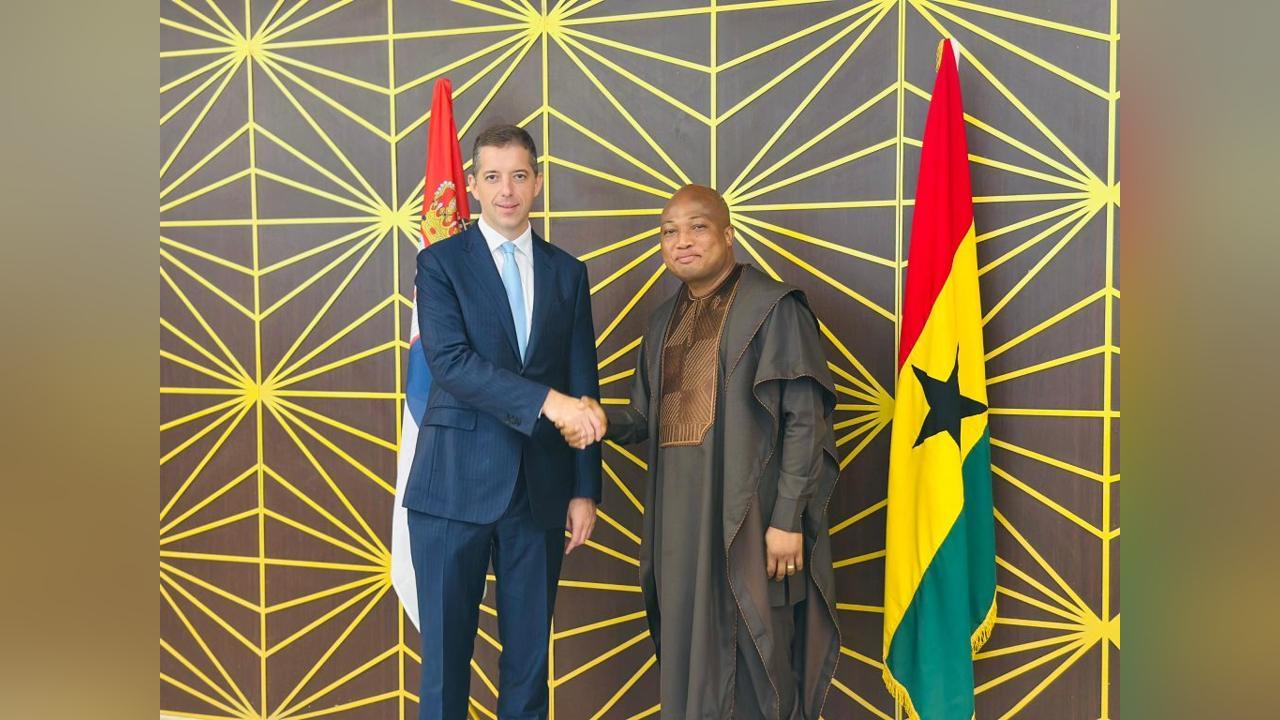Africa-Press – Ghana. Ghana and Serbia have signalled a strong intention to reinvigorate their bilateral trade and economic cooperation.
The two countries identified key areas such as agriculture, technology, artificial intelligence, and industrial development as pillars of a new phase in their historic relationship.
This renewed focus was brought to the fore during the official three-day visit of Serbia’s Minister of Foreign Affairs, Marko Đurić, to Ghana.
The visit, which includes engagements with various Ghanaian ministries and state institutions, is aimed at deepening bilateral ties that date back to the Non-Aligned Movement era of the 1960s.
During bilateral discussions, Ghana’s Minister of Foreign Affairs, Mr Samuel Okudzeto Ablakwa, emphasised the untapped potential in trade relations between the two countries and the urgent need to unlock mutually beneficial economic opportunities.
“The current volume of trade between Ghana and Serbia is unimpressive, and there is more we can do to bridge this gap,” Mr Ablakwa stated.
He said, “Our private sectors must explore innovative avenues for collaboration in agriculture, manufacturing, ICT, and energy.”
Ghana, with its strategic location and role as host of the African Continental Free Trade Area (AfCFTA) Secretariat, was presented as a gateway to a broader African market of over 1.4 billion people.
Mr Ablakwa, therefore, urged Serbian investors to take full advantage of this position, describing Ghana as an ideal base for Serbian businesses seeking entry into the African market.
Ghana’s Foreign Minister highlighted the Government’s recent initiatives such as the One Million Coders Programme, the $1 billion Innovation Hub project, and the $50 billion Fintech Support Fund, all aimed at fostering a digital economy.
He said these initiatives offered fertile ground for partnerships in software development, AI integration, and smart technologies.
Both sides also noted the potential in infrastructure and maritime trade with Mr Ablakwa commending Serbia’s support in modernising Ghana’s Vessel Traffic Management Information System (VTMIS), which would enhance over-the-horizon surveillance and improve maritime safety.
He said this project, implemented through collaboration between the Ghana Maritime Authority and Serbia’s Vlatacom Research and Development Institute, would strengthen Ghana’s port and logistics ecosystem as a key enabler for trade.
On his part, Mr Đurić noted that Serbia had undergone significant economic transformation in the past decade, reducing its debt-to-GDP ratio from 79 per cent to under 50 per cent and slashing unemployment from 20 per cent to below 7 per cent.
He said Serbia was now actively seeking trade and investment partnerships in emerging markets, particularly in Africa, and that “We see Ghana as a key regional ally and partner rooted in historic friendship but focused on contemporary and future cooperation.”
The Foreign Minister added that the Serbian government would work closely with Ghana to boost cooperation in agriculture, an area he described as a major growth driver for both economies.
Serbia’s biotechnology institutes and agricultural research centres, he said, were ready to partner with Ghana to enhance food production, safety and security.
In an interaction with the media, Mr Đurić disclosed that discussions had been scheduled with Ghana’s Minister for Food and Agriculture to identify concrete areas of partnership in agri-tech, irrigation systems, and biotechnology to boost yields and reduce post-harvest losses.
Another promising avenue for trade cooperation is the emerging lithium industry as Ghana and Serbia have confirmed significant lithium deposits, a critical resource in the global transition to clean energy and the development of electric vehicles.
The ministers agreed on joint research and technical collaboration in lithium exploration, extraction, and value addition to ensure local beneficiation and industrial development.
Mr Đurić, whose country currently chairs the Global Partnership on Artificial Intelligence, expressed strong interest in aligning Ghanaian and Serbian innovation efforts.
He said, “We want the people of Ghana and Serbia to shape the future of this important technology together. There is room for joint ventures, knowledge exchange, and business incubation to support AI start-ups.”
In line with Ghana’s commitment to a 24-hour economy and economic diversification, the two countries agreed to explore investment in logistics, construction, renewable energy, and vocational training to enhance the capabilities of the workforce for the modern job market.
Mr Đurić noted that Ghana’s stability, democratic credentials, and youthful population made it a top choice for long-term Serbian investment.
For More News And Analysis About Ghana Follow Africa-Press







